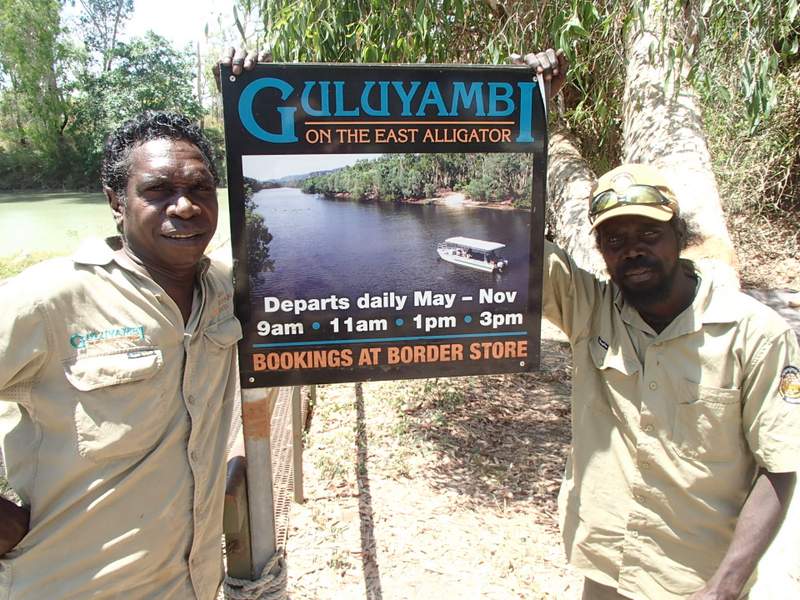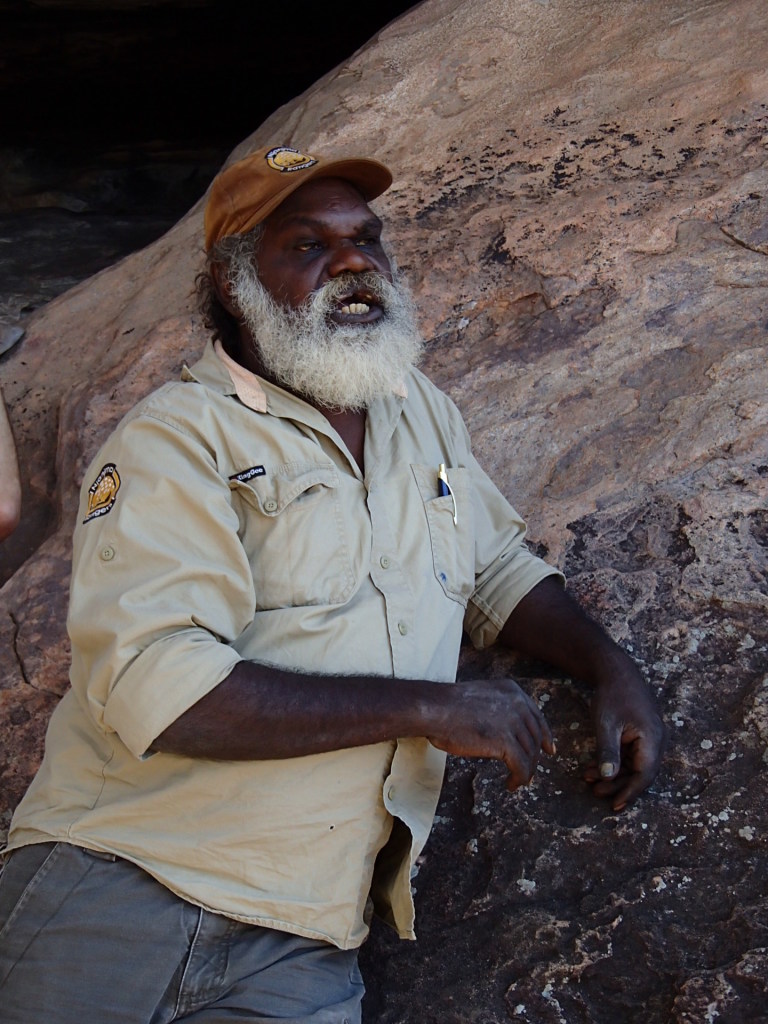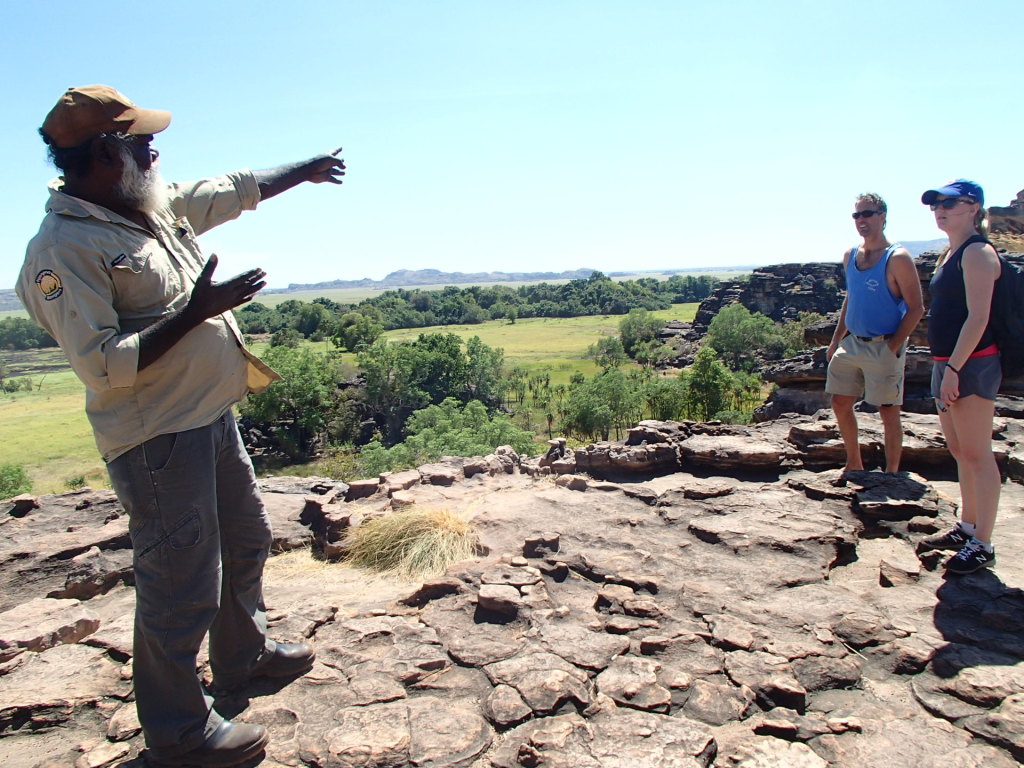Nakangila Kayolyolme Njanjma Rangers
Nakangila Terrance Nabegeyo talks about his work with the Njanjma Rangers.
An interview with Andy Peart.
[soundcloud url="https://api.soundcloud.com/tracks/179251616" params="color=ff5500&auto_play=false&hide_related=false&show_comments=true&show_user=true&show_reposts=false" width="100%" height="166" iframe="true" /]
Terrance (on right in photo) talking about Guluyambi Cruises on East Alligator. In the photo he is with Neville Namarnyilk (Bulanj Na-burlalhdja)
[00:00:01.00] AP: Nangale ngudda?
What is your name?
[00:00:01.17] TN: Ngaye Terrance.
My name is Terrance.
[00:00:04.14] AP: Baleh kun-kurlah ngudda?
What is your subsection name?
[00:00:06.16] TN: Ngaye Na-kangila.
I am Nakangila subsection.
[00:00:09.01] AP: Dja kun-nguya?
And what is your clan group?
[00:00:09.01] TN: Kun-nguya ngarduk Djalama.
My clan group is Djalama.
[00:00:13.00] AP: Mah. And baleh yi-rrurrkmirri, Nakangila?
Ok, and where do you work Nakangila?
[00:00:19.27] TN: Guluyambi nga-rrurrkmirri.
I work at Guluyambi boat tours.
[00:00:19.27] AP: Guluyambi. And baleh yiben-kan nawu tourists?
Guluyambi, and where do you take the tourists?
[00:00:22.19] TN: Ngarrben-kan downstream, ngarrben-marneyolyolme manu dabbarrabbolk manu birri-djowkkeni. Manekke.
We take them downstream, and tell them about how the old people used to cross there. Like that.
[00:00:48.08] AP: And njale yiben-bukkan, like, yiman kun-djakkorl, kinga?
And what do you show them, for instance – wood used to make fire, crocodiles etc?
[00:00:56.08] TN: Wanjh bu kumekke ngarri-re kandjikandji ngarrben-bukkan manekke manu man-bolh dabbarrabbolk birri-djowkkeni wanjh ngarrim-bidbun konda ngarrim-re wanjh ngarrben-bukkan kun-dulk, mani njamed ka-ngeyyo, alabbanjdja. Mani manu korroko dabbarrabbok birri-mangi manu birri-marnbuni kun-yarl mani kun-kurlah ngalengarre, dja kun-dulk mani birri-mangi birri-marnbuni borndok, man-kole, kun-djakkorl. Mak mani man-nguy birri-nguni mani bu birri-bekkani, birri-njambabangmeni. .
Well we taken them down river and show them where old people crossed, then we come back upstream. We show them trees, that – what's it called – alabbanjdja (Hisbiscus tiliaceus). That's the one the old people used to get and make string from its bark, and other trees they used to get and make spear throwers, spears, firesticks. And that flower they used to eat when they felt stomach pain.
[00:01:26.19] AP: And baleh ka-yime nawu tourists yiben-kan?
And how many tourists do you take on the tour?
[00:01:31.00] TN: Yika birri-wern mirndewernwurd ngaben-kan, yika birri-mirndeyahwurd.
Sometimes I take a big group, sometimes only a few.
[00:01:38.10] AP: Mah. Dja baleh birrim-dolkkang beh, nawu tourists?
And they have they come from?
[00:01:43.09] TN: Kubolkbubuyika birrim-bolkkang nakka, nakka kabirrim-re ngandih-nan ngadberre, ngandi-reddjahwon.
They've come from all different places to see us and come to visit our country.
[00:01:54.14] AP: Dja birri-bolkbubuyika - Australia, America, Europe?
From different places in Australia, America, Europe?
[00:01:59.14] TN: Yoh.
Yes.
[00:01:59.14] AP: And bu yiben-kan nawu tourists kaddum kukabo, njale ka-bolkngeyyo kumekke?
And when you take them upstream, what are the names of some of the places you go to?
[00:02:09.07] TN: Ngarrbenkan Wurlanjmarr kumekke ngarrben-wohbolkbukkan,
We take them to Wurlanjmarr [Kurlanjmarr] and show them around a bit
[00:02:15.08] Ral kumekke ngarrben-wohbukkan, ngarrben-wohkan kaluk kunukka bim ka-bimdi kumekke ngarrben-woh... marneyolyolme manekke bim.
then to Ral and show them around and there is rock art there so we tell them stories about the rock art there.
[00:02:22.23] wajnh ngarrben-kan beh, kaddum.
Then we from there we take them upstream.
[00:02:26.29] AP: Mah. Dja yiddok borledmikenh kukabo kabirri-bidbun, kabirri-re kurrenge?
Yes, and they go for a walk on the other side of the river don’t they?
[00:02:35.11] TN: Kumekke ngarrire wanjh kunukka Mabarlakadjang kumekke ka-bolkngeyyo kore ngarri-re wanjh demonstrating ngarri-yime, ngarri-koleburriwe man-kole.
We go there to the place called Mabarlakadjang and there we demonstrate for them how to throw spears.
[00:02:45.02] TN: Kabirri-re kabirri-wohrewohre kabirri-bolknabolknan kumekke birri-kukbele wanjh ngandi-nan ngadberre ngarri-koleburriwe man-kole. Wanjh bonj ngarrim-durndeng.
They go there, those white people have a look around and check the place out there and then they watch us throwing spears. Then we come back.
[00:02:56.15] TN: Ngarrben-kurrme kured.
We put them back home [on the river bank].
[00:03:02.20] Wanjh bonj.
And that’s all.
Credits: Photo, audio recording, transcription and translation by Andy Peart, Njanjma Rangers.


